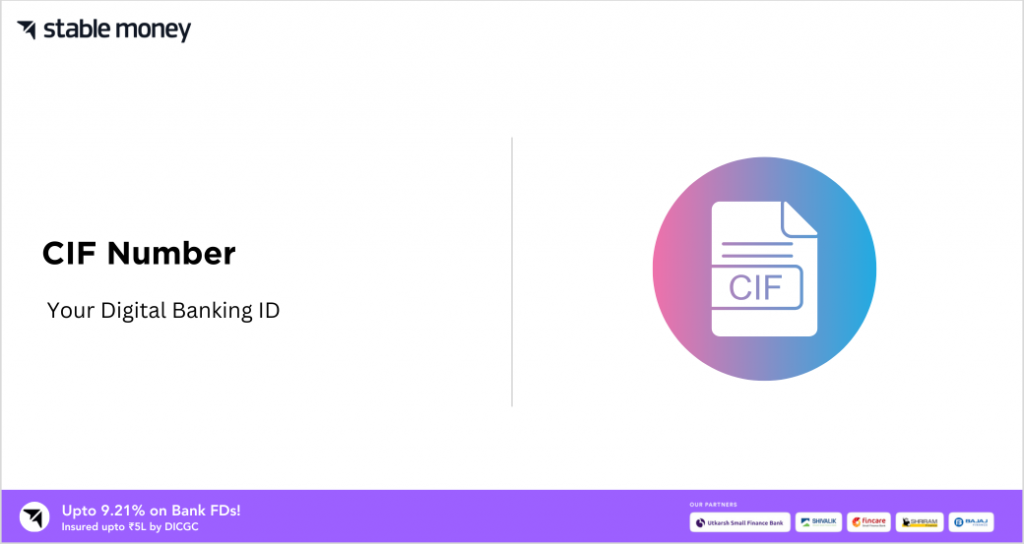
A series of numbers assigned to every bank customer, the CIF number is a unique identifier crucial to the banking sector. This Customer Information File plays a vital role in managing information for the ease of banking operations and the customers.
What is the Meaning of CIF Code
CIF number means Customer Identification File. It is an electronic number assigned by the bank which contains the customer’s personal information. This digital file, also known as the Customer Information File, often includes personally identifiable Information (PII) of the customer, such as identity proof, birth date, social security number, loan details, KYC, and DEMAT details of all customer accounts. A unique CIF number is assigned to each bank customer.
Example of CIF Code
Some examples of Customer Information File numbers include the customer’s name, email address, date of birth, transaction history, address, etc.
What Does the CIF Number Contain?
CIF number contains the customer’s personal information and banking history. For example:
- The customer’s Personal information, such as Date of Birth, Social Security Number, etc.
- Balances of all the bank accounts
- Transaction History
- Types of accounts maintained
- Loan history
- Credit Score
- Demat account details
- KYC Information (Know Your Customer)
How to Know Your CIF Number?
There are different methods available to help you know your CIF. It is one’s customer ID; therefore, it is evident that it will be available for every product the bank offers, such as a passbook, chequebook, debit card, etc. You can also get a CIF number through net banking and SMS. Let us find out various methods through which you can find your bank account CIF number.
- Netbanking: You can utilise net banking services to find CIF number. Go to the account profile or summary section of the net banking platform.
- Toll-Free Number: You can contact the bank’s toll-free number, verify your basic details such as name, date of birth, and contact number, and get your CIF number.
- Passbook: You can find your CIF no in the passbook. The first page of your passbook generally has all the account details, such as account number, name, phone number, IFSC Code and CIF ID.
- SMS Banking: You can SMS the bank’s designated number prescribed to receive the CIF on the registered phone number.
- Visit the branch: You can visit the bank branch and consult with the customer service representative.
- Cheque Book: Your CIF number is generally mentioned on the first page of your chequebook, along with all the other details.
- Fixed Deposit Certificate: The customer’s FD certificate always mentions the CIF number. You can check the certificate to know the CIF number if you have done FD.
Working of CIF Number
CIF ID is a one-of-a-kind number assigned to every bank account holder. It provides vital information about the customer, which helps monitor the bank’s activities. The bank can enter CIF no once and access all his information and past transaction history simultaneously. Being a non-transferable number, there is a rare chance of error or duplication within the records. The CIF ID number, which contains the customer’s account information, is often printed on the passbook’s front page. In the case of a debit card, a CVV number holds the customer’s information but is much shorter.
What is the Importance of CIF ID
A CIF ID means having a unique number for each customer to ensure everything is clear for people with the same name, date of birth or email address. Here are some of the essential functions of the CIF number:
- It enables banks to provide accurate and efficient services. For example, if someone wants to reactivate their dormant account, the bank can directly access the information about the account from the CIF number and do what is needed. There is no need to find the account number or additional information before contacting the bank
- It helps prevent fraudulent activity or mistakes through each customer’s database. The bank can access the transaction history and verify transactions in case of any impersonation.
- CIF ID can help the bank assess the customer’s customer’s loan credit score. Having a CIF is extremely helpful when it comes to sanctioning loans. The bank can access an extensive database that shows customers’ history and past experiences with loans. This assesses whether there is a chance of the customer defaulting on a loan or not.
- It holds sensitive information about the customer. For example, the trail of OTP (one-time password) every time you make an online purchase is registered in the database of your bank CIF number.
- The bank can offer you certain products or personalised schemes by looking at your transaction history. For example, if you travel frequently, you can get a specific discount on flights or hotel bookings using a debit card.
Difference Between CIF ID & IFSC Code
Following is a detailed CIF Number to IFSC Code of the bank distinction:
| Particulars | CIF ID | IFSC Code |
| Full Form | Customer Information File Code. It is a unique code given to each customer by a bank. | Indian Financial System Code. It is a code used to identify bank branches in the inter-banking system. |
| Purpose | It is used by banks to identify, maintain and monitor customers’ relevant information and transaction details to provide efficient services. | These are primarily used to identify bank branches during online transactions such as NEFT (National Electronic Funds Transfer) and RTGS (Real Time Gross Settlement). It is also used to determine which account is registered within which branch. |
| Use | They are used for the bank’s internal purposes, such as tracking transactions, preventing fraud, managing the account, and assessing the customer’s credit score. | The customer uses it for accurate interbank transactions carried out electronically within the branches. |
| Length | The length depends from bank to bank. It usually needs to be standardised. | It has 11 characters, including alphabets and numbers for easy branch identification. |
| Format | It is alphanumeric, and the format depends from bank to bank. | It is also alphanumeric but follows a specific format given by the Reserve Bank of India. |
Is CIF Number a Marketing Tool or Used For Security Purpose?
Your CIF number can be used as a marketing tool or for security purposes.
Commercial banks often use CIF numbers to understand customer’s needs and interests. This data is later used as a marketing tool for new products and offers that are tailor-made for the customer. The bank can create customised offers for existing customers or group them under specific target groups. CIF can help cross-sell and offer complementary products.
For security purposes, the bank creates a log of all the devices and the network address used by the customer while using the banking app. Whenever the system detects that the application is logged through a different device or network, it sends a security alert to the customer and the bank. This system ensures the security of the customer and prevents any financial fraud.
What Information do Banks collect in CIF Numbers?
The foremost function of a CIF number is to serve as a transaction log of a customer’s banking history. However, many other things that banks collect serve different functions. For Example:
- Credit Records: Records of various credit products availed by the customer in the past. Such as business loans, personal loans, credit cards and so on.
- Past Enquiries: Previous enquiries made by the customer regarding any additional banking products such as home loans, credit cards, etc.
- Online Data Collection: Banks collect online customer data from the web and collate them to identify the customers’ habits, lifestyles, and interests.
- Online Activities and Purchase History: The bank logs customers’ online activities and purchase history in the CIF to segregate the customers into a target group. For example, the customer could be targeted as a trekking enthusiast male. So, the bank can provide services according to the category.
- Browsing and Social Media Activities: A person who uses banking services on their mobile device gives access to their browsing and social media activities. The bank uses it for marketing purposes. If you have browsed for baby products, you are likely to see offers of baby products by the bank.
- Security Purpose: CIF records the type of mobile device and network address. Therefore, you get a security alert whenever you try to sign in to your bank app from a different device.
Is Financial Fraud is Possible With CIF Numbers?
Since CIF is a technical mechanism, there is a chance of errors. Nothing is foolproof. However, there are some examples to explain the potential harm or financial fraud that can be caused concerning CIF numbers.
- A scammer can try to obtain your CIF number through various means, such as social media engineering tactics, data theft or phishing scams.
- If a fraudster successfully obtains your CIF number, it can access your sensitive information, such as passwords or identification details.
- Identity theft is the most common form of fraud that can occur after the fraudster gets access to your personal information through CIF. They can do fraudulent transactions in your name.
- The CIF ID can be used to conduct unauthorised transactions such as making purchases, withdrawing money or transferring funds from the customer’s bank account.
- Multiple financial scams can damage the customer’s credit history. The victim could also face legal and reputational consequences.
Prevention: When it comes to CIF numbers, the individual must remain vigilant. They should use strong passwords and monitor their accounts regularly. In case of any suspicious activity or unauthorised transaction, they should block all their cards by contacting the bank and reporting the fraud immediately.
Advantages & Disadvantages of a CIF No?
Here are the advantages and disadvantages of having a CIF number:
1. Advantages
- Smooth Customer Management: CIF streamlines customer data such as transactions, personal information, browsing history, credit history, and much more, which helps the bank manage and track customer accounts.
- Enhanced Security: The CIF number helps verify the customer and the devices by accessing personal and location information. This mitigates the risk of identity theft and financial fraud.
- Improved Customer Service: By analysing the customer’s behaviour pattern, the bank can offer personalised solutions to the customer, leading to higher satisfaction levels.
- Increase Cross Selling: The CIF number records customer preferences, browsing history and past purchases. This enabled the bank to provide products and services customers would likely buy.
2. Disadvantages
- Privacy Breach: Scammers can gain access to customers’ sensitive private information and misuse the data for their gain.
- Heavy dependence on Technology: The banking system heavily depends on technology. In case of system failure, technical glitch or cyber attack, it could take down the country’s whole banking system.
Final Word
In conclusion, CIF ID’s role is to collect information from the customer and streamline transactions, provide personalised solutions, promote demand in the market, and enhance financial security in the country’s banking sector.
Top Investment Pages
FAQs
Generally, a customer can have only one CIF number per bank. A CIF number is a unique number the bank assigns to its customer. It can link multiple accounts within a single bank.
No. The CIF number is a unique identification number of the customer, whereas the account number is a unique identifier of the customer’s account.
You can update your personal CIF information by visiting your bank’s branch. If the data is based on the bank’s products and services, it is automatically registered in the CIF ID.
No. The CIF number is non-transferable and is specific to each bank. When you open an account with another bank, you will be assigned a new CIF ID.
Disclaimer
This article is solely for educational purposes. Stable Money doesn't take any responsibility for the information or claims made in the blog.

